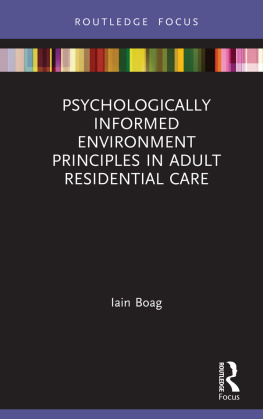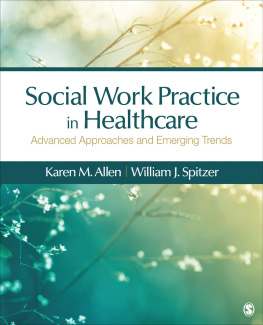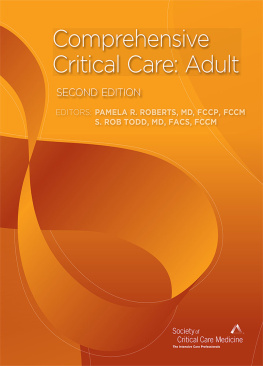TRANSFORMING ADULT SOCIAL CARE
Contemporary policy and practice
Ann Marie Gray and Derek Birrell
First published in Great Britain in 2013 by
The Policy Press
University of Bristol
Fourth Floor
Beacon House
Queens Road
Bristol BS8 1QU
UK
Tel +44 (0)117 331 4054
Fax +44 (0)117 331 4093
e-mail
www.policypress.co.uk
North American office:
The Policy Press
c/o The University of Chicago Press
1427 East 60th Street
Chicago, IL 60637, USA
t: +1 773 702 7700
f: +1 773-702-9756
e:
www.press.uchicago.edu
The Policy Press 2013
British Library Cataloguing in Publication Data
A catalogue record for this book is available from the British Library.
Library of Congress Cataloging-in-Publication Data
A catalog record for this book has been requested.
ISBN 978 1 84742 799 1 paperback
ISBN 978 1 84742 800 4 hardcover
The right of Ann Marie Gray and Derek Birrell to be identified as authors of this work has been asserted by them in accordance with the 1988 Copyright, Designs and Patents Act.
All rights reserved: no part of this publication may be reproduced, stored in a retrieval system, or transmitted in any form or by any means, electronic, mechanical, photocopying, recording, or otherwise without the prior permission of The Policy Press.
The statements and opinions contained within this publication are solely those of the authors and not of The University of Bristol or The Policy Press. The University of Bristol and The Policy Press disclaim responsibility for any injury to persons or property resulting from any material published in this publication.
The Policy Press works to counter discrimination on grounds of gender, race, disability, age and sexuality.
Cover design by Qube Design Associates, Bristol
Front cover: image kindly supplied by www.alamy.com
Printed and bound in Great Britain by Hobbs, Southampton
The Policy Press uses environmentally responsible print partners.
Readers Guide
This book has been optimised for PDA.
Tables may have been presented to accommodate this devices limitations.
Image presentation is limited by this devices limitations.
Contents
Ann Marie Gray:
To my granddaughter Chloe
Derek Birrell:
To my granddaughter Lucy
ADASS | Association of Directors of Adult Social Services [England] |
ADSS Cymru | Association for Directors of Social Services Cymru [Wales] |
ADSW | Association of Directors of Social Work [Scotland] |
CHP | community health partnership |
COSLA | Convention of Scottish Local Authorities |
CQC | Care Quality Commission |
DASS | director of adult social services |
EEA | European Economic Area |
GP | general practitioner |
GSCC | General Social Care Council |
HCPC | Health and Care Professions Council |
ISA | Independent Safeguarding Authority |
JIT | Joint Improvement Team |
LGA | Local Government Association |
LINk | Local Involvement Network |
NHS | National Health Service |
NICE | National Institute for Health and Clinical Excellence |
NMDS-CS | National Minimum Data Set for Social Care |
PALS | Patient Advice and Liaison Services |
PCT | primary care trust |
POPPs | Partnerships for Older People Projects |
RQIA | Regulation and Quality Improvement Authority |
SCIE | Social Care Institute for Excellence |
UK | United Kingdom |
UKHCA | UK Home Care Association |
ULO | user-led organisation |
WLGA | Welsh Local Government Association |
We would like to thank Liz McNeill for her invaluable administrative assistance. Grateful thanks to Emily Watt, Jo Morton and the production team at The Policy Press for their support and efficient management of the process.
Overview
Adult social care has emerged as a distinct area of provision following the separation from childrens services after 2006. This decision was driven by concerns relating to childrens social care and services, not to adult services. In the first instance this meant organisational separation from the area of child protection and children and family services in local authorities in England. Social care in general had had a distinct existence from the National Health Service (NHS) in the United Kingdom (UK) from 1948. The separation from childrens services was to lead quickly to a clear focus on the notion of adult social care as a distinct entity and the use of the term became established in most governmental, professional and academic writing. The term adult social care has largely replaced the former general terms of personal social services and community care with new attempts to define the term. The distinctiveness of adult social care services has not, however, meant a reduction in the importance given to the relationship of adult social care to health or other cognate services. Adult social care services are expected to work closely in partnerships with the NHS, other public services and the independent sectors. As adult social care has become established as an area of provision, a number of factors have pushed adult care into a major issue on the government agenda and in public debate. These include demographic change, growing needs, pressure on public expenditure, welfare retrenchment, promoting independence and the balance with health. The debate on problems, principles and policy options has led to the adoption of major strategies in terms of modernisation, vision statements and more recently a transformation of care. Underpinning principles under debate relate to the balance of responsibilities between the individual and the state, the role of contracting out and funding arrangements and changes, reliance on unpaid care and law reform. The potential for further transformation lies in developing the emerging key values of personalisation, integration and user participation. Further key delivery issues relate to safeguarding, outcomes, diversity, the role of carers and the nature of the workforce.
Definitions of adult social care
The emergence of the distinct area of adult social care led government bodies to define the area for official purposes. The Department of Health adopted originally a broad enabling definition in the key paper Our health, our care, our say (DH, 2006a). This defined adult social care as the wide range of services designed to support people to maintain their independence, enable them to play a fuller part in society, protect them in vulnerable situations and manage complex relationships (2006, para 2.5). Attempts at definitions have tended towards purpose-based statements rather than a listing of provision. Thus, the current definition used by the Department of Health refers to promoting peoples wellbeing and independence and giving them control over their lives (DH, 2012a, p 8). The Law Commission, in a major study of the legal status of social care, decided that it was not possible to provide a single definition. It examined a service-orientated definition that adult social care means the care and support provided by local authority social services pursuant to their responsibilities towards adults who need extra support (Law Commission, 2011, para 1.5). Also examined was an approach based on tightly defined processes, which served to determine the scope of adult social care, for example, community care assessments and care planning. In the end the Law Commission preferred to define the purpose of adult social care as promoting or contributing to the well-being of the individual (Law Commission, 2011, para 2.1), although it also noted the developing range of non-traditional services such as art therapy, personal assistance and life coaching. Other contributions to definitions have stressed the importance of social care. In 1998, the landmark White Paper








